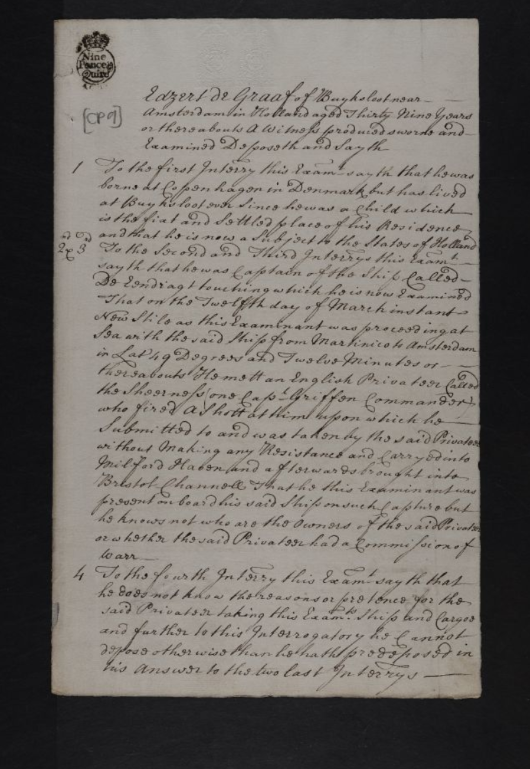De Eendraght

De Eendraght
In the spring of 1747 Edsert de Graaf, captain of the Dutch ship De Eendragt, made an unusual decision: instead of heading for the ship’s original destination St. Eustatius, he sailed to Martinique, an island belonging to the French Empire. As the ship, loaded with coffee, cotton, sugar, cocoa and lemon juice, made its way back to Amsterdam, it was captured by the British privateer Sheerness under the command of Peter Griffin.
The Eendragt was taken to Milford Haven and then to Bristol. When the captain referred to the neutrality of the Dutch ship, the privateers were sceptical: after all, goods originating from Martinique – a French colony – were on board.
When asked why the voyage to St. Eustatius was interrupted in the first place and why Martinique was chosen instead, the sailors questioned gave an amazing answer: there had been an illness on board, the crew had been unable to navigate and had only been able to head for the nearest port of rescue – Martinique.
The crew were interrogated intensively. In addition to the usual standardized set of questions put to crew members after captures, they were confronted with additional examinations, which picked up on particular aspects of the case: Was there ever any intention of travelling to St. Eustatius? How many of them were actually sick at the time? Who exactly had been on board since Amsterdam, and who boarded the ship in Martinique? What original cargo was sold in Martinique and what goods were then loaded onto the ship there? When it became clear that a large number of the original Bills of Lading had disappeared and that a passenger – a merchant – had joined them in Martinique, suspicions amongst the British increased. Another question concerned the identity of the captain, Edsert de Graaf. He was born in Copenhagen, but had spent his childhood and youth in Buiksloot, a district of Amsterdam. He claimed to be a Dutch subject, but his interrogators repeatedly questioned him about his affiliation during the examinations. The British also made a point of eliciting the precise course of events on Martinique and during the loading of goods onto the ship during the examinations.
The court records on the Eendraght are relevant to various fields of research. Although it cannot ultimately be clarified whether the crew on the Eendraght was actually ill, there are nevertheless opportunities for questions relating to the history of medicine, for this capture demonstrates how disease became an argument for a changed voyage route. The Eendraght also offers a case study of how illness was dealt with on ships and under which circumstances the argument ‘illness’ was deemed plausible – or not.
In the case of the formally neutral Eendraght, the Commission advanced an accusation of smuggling. Yet in the end, this could not be proven: in the trial, the court recognised the ship as neutral.
This case nevertheless provides an insight into early modern Atlantic smuggling, which was at least considered plausible here by the privateers and the court. The court officials compiled files containing extensive interviews of a crew originating from different regions in Denmark, the Netherlands and Germany. They were not only questioned about their origins, but also about their specific behaviours on bord in unusual situations, such as illness or a change of route. In this way the documents also offer us a glimpse into everyday life at sea.
Discover HCA 32/108/2: De Eendraght in TNA Discovery
Browse the documents in the Prize Papers Portal

by Dr Jessica Cronshagen
Schools and Museums Liaison
Contact: j.cronshagen@uni-oldenburg.de
Credit: De Eendraght, TNA, HCA 32/108/2, Photo: Maria Cardamone, Mustapha Ousellam, Prize Papers Project. © Images reproduced by permission of The National Archives, London, England.

